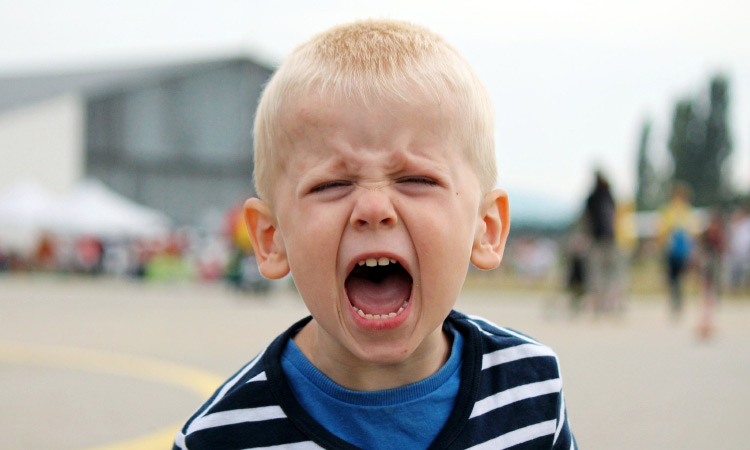Every child pushes boundaries and tests the limits of a parent’s patience. But some children have particularly intense emotions and express them frequently, challenging parents to their core. Those challenges can send parents and children spiraling into negative patterns of behavior they desperately need to change.
These guidelines can help parents understand children’s behavior and set appropriate limits. In some situations, it’s time to ask for professional help.
Defuse the anger
During an emotional episode, it’s difficult to think clearly about the best strategy. Often, parents have a hard time changing their own behavior in dynamic with their child. Negative habits, such as yelling in frustration, become difficult to break. Research shows making game plans to deal with difficult scenarios in advance greatly increases the likelihood parents will be able to follow through with their goals of making better choices in the moment.
Model good anger management skills. Take a moment to calm down, then formulate an “I” message. For example, “I get angry when you throw things. I need you to pick up what you threw before you go do anything else.” On the other hand, comments such as “Why can’t you stop?” or “You’re always like this” belittle and blame a child, as a personal attack.
Sometimes the last thing you want when your child is acting out is to reach out with a loving touch. But a hug when your child is upset releases oxytocin and stress hormones, and can defuse the anger in you both.
Laughter also releases stress; joking during an intense moment can shift the tone, allowing you to reconnect with your child. One study suggests humor can even dissuade negative behavior and help strengthen difficult relationships.
Listen and talk to your child about their feelings
After breaking through the anger, talk to your child about what’s really bothering them. Kids often “shift” their feelings, or act up about one thing because they are upset about something else, according to Christine Carter, PhD, author of Raising Happiness: 10 Simple Steps for More Joyful Kids and Happier Parents.
First, stop talking and listen to your child, says Kristin Kenefick PsyD. Active listening means trying to understand your child’s perspective without jumping in and immediately trying to fix the problem. Encourage your child to share more sad or upset feelings in the future by telling them you are proud of their courage.
Explain the difference between feelings and actions. Feelings are always okay, but offer appropriate choices to express angry feelings, such as exercise, deep breathing or writing letters not intended to be sent.
How to set consistent limits
Teach your child that no means no by not negotiating, says Carter.
A recent study indicates consistent punishment has stronger effects on choices than reward, but reward still functions well as a separate cognitive process.
Alan Kazdin PhD, of the Yale Parenting Center, makes the reward into a game by giving children choices—or the illusion of choices. For example, saying, “I wonder whose room will be the cleanest when Grandma comes over in 30 minutes” is followed by specific praise for the winner and everyone who cleaned.
Consistency is also key for time-outs. Studies show using time outs spontaneously or sporadically doesn’t work. But telling children in advance what behavior will cause a timeout, and following through, leads to fewer problem behaviors long-term. A clear, predictable single warning time out system is also effective.
Kenefick encourages parents to remember teenagers need increasing amounts of freedom as they grow, within a balance of structured limits.
Teenagers may feel angry and alone—like no understands them—while confronting typical challenges such as dating, driving, curfew, smoking, drinking and other drug use, with their changing hormones. The American Psychological Association (APA) recommends speaking calmly and from the heart—rather than script-like—when communicating with your teenager, and trying to set aside a regular weekly or bi-weekly time to talk.
When to seek professional help
While many parents worry about their child’s unruly behaviors, ask yourself, to what extent the behavior is interfering with your child’s functioning. If your child’s grades are dropping, they are getting in trouble at home or school or struggling with friendships, seek professional help. Your child also may need assistance for chronic sadness, extreme quiet or trouble sleeping. Consult a parent coach, therapist, or guidance counselor.
Teens and adolescents may need professional help in cases of aggressive, violent, criminal or runaway behavior, drug or alcohol abuse or truancy. For suicide risk, according to the APA, “Warning signs may include significant alcohol or drug use, a sudden drop in school performance or talking about death or hurting oneself.”
With patience, diligence and support, you can help your child learn to manage their feelings and behavior while building a stronger relationship.
Click here to see Rose’s tips for healthy and happy relationships



1 Comment
Katie
I needed to write to you to say thanks a lot again on the wonderful articles you’ve featured on this site. These inspiring ideas are a great way to understand that some people have similar mindsets as me & I have learned a whole lot more with regard to this issue. I am sure there are lots of more enjoyable periods in the future for folks who discover your blog. Thanks